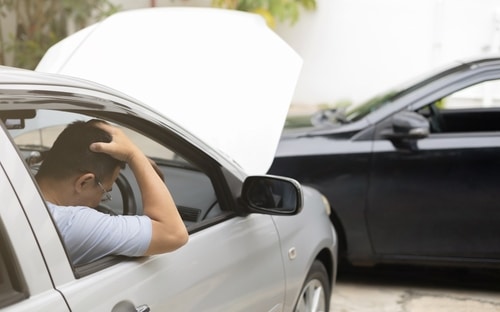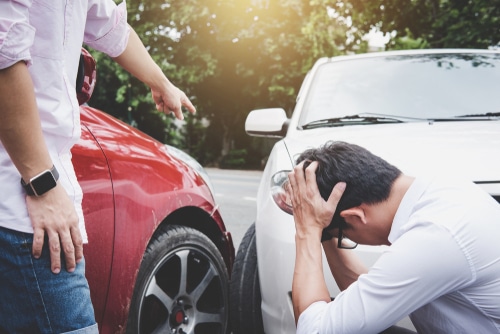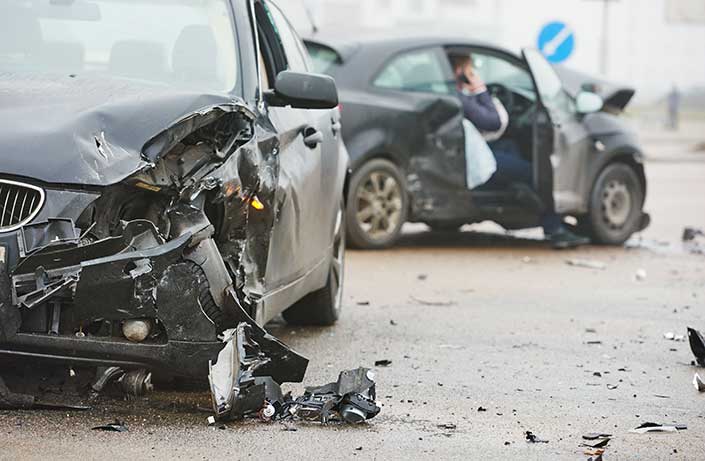Immediate Steps After the Accident
After a car accident involving an at-fault driver who doesn’t have insurance, taking the right steps is crucial. Here are the immediate actions you should consider:
Calling the Police and Filing a Report
Always call the police after an accident. A police report provides an official record of the incident. This document is important for your car insurance claim and any potential legal action. Officers can assess the situation and determine who was at fault. Their findings can support your case later.
Documenting the Accident Scene Thoroughly
Take photos of the accident site. Capture images of all vehicles involved, road conditions, traffic signs, and any visible injuries. This documentation can serve as evidence in your claim. Write down details about the accident, including the time, location, and weather conditions. Collect contact information from witnesses as well, as their statements may help your case.
Exchanging Contact Information with the Uninsured Driver
Even if the other driver lacks insurance, exchange contact information. Obtain their name, phone number, and any other relevant details. This information can be useful for your records and any future claims.
Seeking Immediate Medical Attention if Necessary
If you or anyone involved has injuries, seek medical attention right away. Some injuries may not be immediately apparent, so it’s important to get checked. Document all medical visits and treatments, as these records will be essential for any personal injury claim you may file later. Prioritize your health and well-being in the aftermath of the accident.
Check Your Own Car Insurance Coverage
After an accident with an uninsured motorist, the first step is to review your own insurance policy. Understanding your coverage can help you navigate the situation effectively.
Understanding Uninsured Motorist Coverage (UM/UIM)
Uninsured motorist coverage (UM) protects you if the at-fault driver does not have car insurance. This coverage helps pay for your medical bills, lost wages, and other damages resulting from the accident. It is important to know if you have this coverage and the limits of your policy. If you live in a state that requires UM coverage, you may have it automatically included in your policy.
Role of Personal Injury Protection (PIP) or Medical Payments Coverage
Personal Injury Protection (PIP) or medical payments coverage can also assist you after an accident. PIP covers medical expenses and, in some cases, lost wages, regardless of who is the at-fault driver. If you have PIP, you can file a claim to get your medical bills paid quickly. Medical payments coverage works similarly but typically has lower limits and may not cover lost wages.
Utilizing Collision Coverage for Vehicle Damage
If your vehicle is damaged in the accident, you may use your collision coverage to pay for repairs. Collision coverage helps cover the costs of fixing your car, regardless of fault. However, keep in mind that you will need to pay your deductible before your auto insurance kicks in. Review your policy to understand your deductible and how it affects your claim.
By checking your insurance coverage, you can take proactive steps to manage the financial impact of the car accident. Knowing your options can help you recover more effectively and ensure you receive the compensation you deserve.
File a Claim with Your Insurance Company
After an accident with an uninsured driver, it is crucial to file a claim with your own insurance company. This step can help you recover damages and cover your expenses.
Importance of Promptly Reporting the Accident
Notify your insurance company as soon as possible after the car accident. Most insurance policies require you to report accidents quickly. Delaying this report may impact your ability to receive compensation. Your insurance provider needs timely information to start the claims process.
Providing Necessary Documentation to Your Insurance Company
When you file your claim, gather all necessary documentation. This may include:
- Accident report from the police
- Photos of the accident scene and vehicle damage
- Medical records or bills related to your injuries
- Any witness statements
Providing thorough documentation will help your insurance company assess your claim accurately.
Understanding Policy Limits and Deductibles
Review your insurance policy to understand your coverage limits and deductibles. Uninsured motorist coverage (UM) can help cover medical expenses and lost compensation. Be aware that your policy may have limits on how much it will pay out. Additionally, you may need to pay a deductible before your insurance kicks in. Knowing these details will prepare you for what to expect during the claims process.
Explore Legal Options
If you find yourself in an accident with an uninsured driver, exploring your legal options is crucial. You may have several avenues to consider, depending on your specific situation.
Considering a Lawsuit Against the Uninsured Driver
One option is to file a lawsuit against the uninsured driver. This action can help you seek compensation for medical bills, lost compensation, and property damage. However, keep in mind that suing an uninsured driver may not guarantee payment. If the driver lacks sufficient assets or income, collecting on a judgment can be difficult.
Challenges of Pursuing Legal Action Against an Uninsured Party
Pursuing legal action against an uninsured driver presents unique challenges. The lack of car insurance may indicate that the driver has limited financial resources. This situation can complicate your efforts to recover damages. Additionally, the process can be lengthy and may require considerable legal expertise.
Consulting with a Knowledgeable Personal Injury Attorney
Consulting with a knowledgeable personal injury lawyer is highly recommended. A car accident lawyer can help you understand your rights and evaluate your options. They can also guide you through the legal process, helping you build a strong case. With their expertise, you can navigate the complexities of pursuing compensation effectively.
In summary, while it is possible to explore legal options against an uninsured driver, it is essential to weigh the potential challenges. Seeking professional legal advice can provide clarity and increase your chances of a successful outcome.
Call Us Today for Help
If you find yourself in a situation where the at-fault driver does not have insurance, it is crucial to act quickly. Our team at Joe Durham P.C. is ready to assist you through this process. Here’s how we can help:
Free Consultation
We offer a free consultation to discuss your case. During this meeting, we will listen to your story, review the details of your car accident, and explain your legal rights. You can ask questions and share your concerns without any obligation.
Expertise in Uninsured Motorist Claims
Our experienced attorneys understand the complexities of uninsured motorist claims. We can help you navigate the process of filing a claim with your own insurance company. Our goal is to ensure you receive fair compensation for your medical expenses, lost compensation, and property damage.
Personalized Support
Every case is unique. We provide personalized support tailored to your situation. Our team will guide you through each step, from gathering evidence to negotiating with car insurance companies. We will work diligently to protect your rights and interests.
Ready to Take Action
Don’t wait to seek the help you need. The sooner you contact us, the better your chances of recovering compensation. Call us today to schedule your free consultation. Let Joe Durham P.C. be your advocate in this challenging time. You deserve support and guidance as you move forward.








